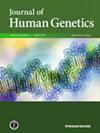Germline mosaicism in TCF20-associated neurodevelopmental disorders: a case study and literature review
IF 2.5
3区 生物学
Q2 GENETICS & HEREDITY
引用次数: 0
Abstract
Autosomal dominant variants in transcription factor 20 (TCF20) can result in TCF20-associated neurodevelopmental disorder (TAND), a condition characterized by developmental delay and intellectual disability, autism, dysmorphisms, dystonia, and variable other neurological features. To date, a total of 91 individuals with TAND have been reported; ~67% of cases arose de novo, while ~10% were inherited, and, intriguingly, ~8% were either confirmed or suspected to have arisen via germline mosaicism. Here, we describe two siblings with a developmental condition characterized by intellectual disability, autism, a circadian rhythm sleep disorder, and attention deficit hyperactivity disorder (ADHD) caused by a novel heterozygous single nucleotide deletion in the TCF20 gene, NM_001378418.1:c.4737del; NP_001365347.1:p.Lys1579Asnfs*36 (GRCh38/hg38). The variant was not detected in DNA extracted from peripheral blood in either parent by Sanger sequencing of PCR-generated amplicons, or by deep sequencing of PCR amplicons using MiSeq and MinION. However, droplet digital PCR (ddPCR) of DNA derived from early morning urine detected the variation in 3.2% of the father’s urothelial cells, confirming germline mosaicism. This report is only the second to confirm with physical evidence TCF20 germline mosaicism and discusses germline mosaicism as a likely under-detected mode of inheritance in neurodevelopmental conditions.

tcf20相关神经发育障碍的种系嵌合体:一个案例研究和文献综述
转录因子20 (TCF20)常染色体显性变异可导致TCF20相关的神经发育障碍(TAND),这是一种以发育迟缓和智力残疾、自闭症、畸形、肌张力障碍和其他可变的神经系统特征为特征的疾病。迄今为止,共报道了91例TAND患者;约67%的病例是从头开始的,约10%是遗传的,有趣的是,约8%的病例被证实或怀疑是通过种系嵌合发生的。在这里,我们描述了两个兄弟姐妹,他们的发育状况以智力残疾、自闭症、昼夜节律睡眠障碍和注意缺陷多动障碍(ADHD)为特征,这些障碍是由TCF20基因NM_001378418.1:c.4737del中的一个新的杂合单核苷酸缺失引起的;NP_001365347.1: p。Lys1579Asnfs * 36 (GRCh38 / hg38)。通过对PCR扩增子进行Sanger测序,或使用MiSeq和MinION对PCR扩增子进行深度测序,从亲本外周血中提取的DNA中均未检测到该变异。然而,清晨尿液DNA的微滴数字PCR (ddPCR)检测到3.2%的父亲尿路上皮细胞的变异,证实了种系嵌合。该报告是第二个用物理证据证实TCF20种系嵌合体的报告,并讨论了种系嵌合体在神经发育疾病中可能是一种未被发现的遗传模式。
本文章由计算机程序翻译,如有差异,请以英文原文为准。
求助全文
约1分钟内获得全文
求助全文
来源期刊

Journal of Human Genetics
生物-遗传学
CiteScore
7.20
自引率
0.00%
发文量
101
审稿时长
4-8 weeks
期刊介绍:
The Journal of Human Genetics is an international journal publishing articles on human genetics, including medical genetics and human genome analysis. It covers all aspects of human genetics, including molecular genetics, clinical genetics, behavioral genetics, immunogenetics, pharmacogenomics, population genetics, functional genomics, epigenetics, genetic counseling and gene therapy.
Articles on the following areas are especially welcome: genetic factors of monogenic and complex disorders, genome-wide association studies, genetic epidemiology, cancer genetics, personal genomics, genotype-phenotype relationships and genome diversity.
 求助内容:
求助内容: 应助结果提醒方式:
应助结果提醒方式:


